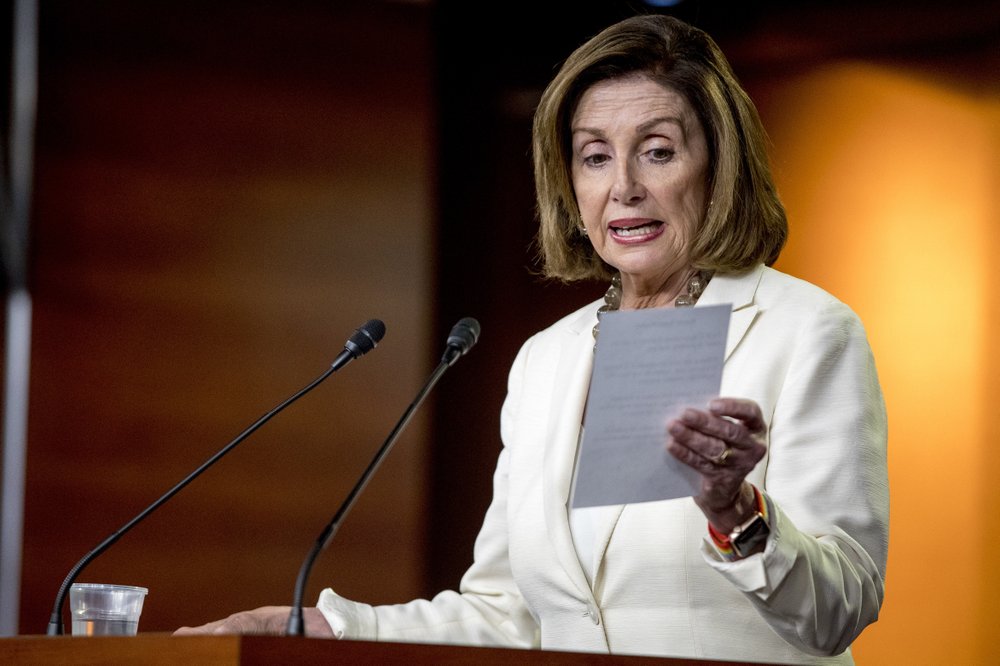Washington negotiators are closing in on a budget and debt deal that would stave off the chance of a government shutdown this fall and allow Congress to speed through legislation to increase the government’s borrowing cap.
The emerging two-year framework would satisfy demands for an outline to guide congressional work on more than $1.3 trillion in agency operating budgets. It would still need to be fleshed out in follow-up legislation, and puts off battles over political land mines like immigration and President Donald Trump’s unfulfilled promises of a border wall.
Obstacles remain and conservative forces inside the White House are resisting a quick deal and want more concessions from Pelosi, who says a deal is needed this week in order to ensure it passes before the summer recess.
The chief advocates of the deal include House Speaker Nancy Pelosi, D-Calif., and Senate Majority Leader Mitch McConnell, R-Ky., along with top Senate Democrat Chuck Schumer of New York. Many House conservatives are likely to oppose it as spending too much on Democratic domestic initiatives and ignoring budget deficits estimated at $1 trillion. Treasury Secretary Steven Mnuchin, focused chiefly on the need to increase the debt limit, is the chief negotiator for the Trump administration.
Pelosi and Schumer spoke with Mnuchin on Wednesday, and the talks have gotten down to timing issues. Pelosi told reporters that “if we’re really going to do this by next Thursday before we leave we have to have some agreement this week.”
“I am genuinely optimistic,” said House Appropriations Committee Chairwoman Nita Lowey, D-N.Y., a key Pelosi ally who is keeping a close watch on the talks.
Also driving the negotiations is the threat of cuts averaging 10% to agency accounts, reversing recent gains for the Pentagon and hard-won increases in domestic programs favored by Democrats. Those cuts are the final leftovers of a failed 2011 budget and debt deal negotiated by former President Barack Obama and then-Speaker John Boehner that used the threat of the automatic cuts to try to prompt additional progress on the deficit. Instead, lawmakers have acted three times to stop the cuts.
The talks have so far been insulated from Washington’s ongoing maelstrom and the already raging presidential campaign. It is not a done deal yet. Both sides worry that Trump could still reject it. But the forces aligned in the talks are powerful and all sides want to deal with the politically toxic debt limit issue without a high-wire act that could cause markets to shudder. Failure to increase the government’s $22 trillion debt cap would spark an unprecedented crisis in which the government couldn’t borrow enough cash to pay all of its bills.
The talks have been going for weeks, but took on new urgency as deficit estimates worsened, creating an unacceptable risk of default in early-to-mid September. At the same time, the Senate Appropriations Committee, stacked with loyalists to McConnell, is aching to start advancing its 12 annual spending bills. The House has passed most of its bills using significantly higher spending figures than what it’s likely to end up with under the emerging agreement. Each has been slapped with a Trump veto threat.
Among the loose ends, and they could be significant, is the issue of how much in accompanying spending cuts should be paired with the short-term spending increases. Past deals have had these so-called offsets, often relying on quick moneymakers like sales from the Strategic Petroleum Reserve or extending small cuts to Medicare providers, but only $60 billion or so is available now.
While Democrats sound optimistic, some GOP factions are dreading the deal, which melds a toxic mix of debt, spending and $1 trillion-plus budget deficits for conservatives to digest. Republicans warn that Trump won’t sign anything that doesn’t enjoy widespread GOP support, but the alternative is to run the government on auto-pilot, a prospect that alarms the Pentagon and its allies.
“When you have divided government you have to make compromises. Neither side gets 100% of what they want,” said Sen. David Perdue, R-Ga. “There’s enough in there it satisfied the needs of both parties trying to get this done. The alternative is so draconian.”
(AP)











